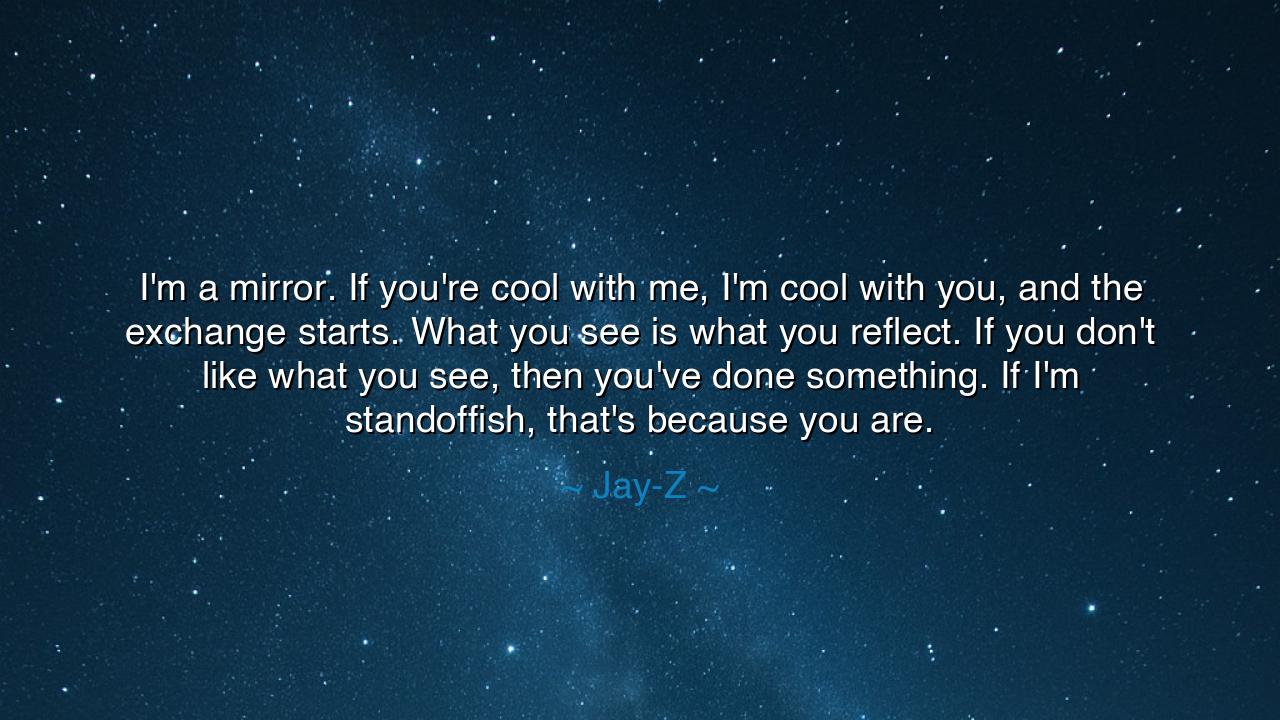
I'm a mirror. If you're cool with me, I'm cool with you, and the
I'm a mirror. If you're cool with me, I'm cool with you, and the exchange starts. What you see is what you reflect. If you don't like what you see, then you've done something. If I'm standoffish, that's because you are.






In the grand theatre of life, where every encounter reflects the essence of human connection, Jay-Z’s words, “I’m a mirror. If you’re cool with me, I’m cool with you, and the exchange starts. What you see is what you reflect. If you don’t like what you see, then you’ve done something. If I’m standoffish, that’s because you are,” offer a profound reflection on the reciprocal nature of relationships. These words echo a timeless truth: that how we treat others is often a direct reflection of how we ourselves are treated. Like a mirror, we reflect the energy, attitude, and intentions that are projected upon us. In essence, we are all participants in a cycle of energy exchange, where our actions toward others shape the actions we receive in return.
The ancients understood this deep truth about human interaction. Confucius, the great Chinese philosopher, often spoke of the importance of reciprocity in relationships. In his teachings, he emphasized that the goodness and virtue we extend to others should be mirrored by the goodness and respect we receive in return. To treat others with kindness and understanding was to cultivate harmony, not only within oneself but also within the community. This ancient wisdom mirrors Jay-Z’s insight, as it suggests that the quality of our interactions with others is shaped by the energy we put forth. If we approach the world with openness and positivity, it is likely that the world will respond in kind.
In ancient Rome, the philosopher Seneca spoke of the importance of inner peace and the impact of our actions on those around us. He believed that the way we engage with others is a reflection of our own character. If we are standoffish, it is because we have allowed the walls of anger, fear, or resentment to form within us. Our interactions are never isolated; they are shaped by the way we present ourselves to the world. Seneca advised that true wisdom lies not in controlling others, but in understanding that we are always in a relationship with the world around us—what we give, we receive. This mirrors Jay-Z’s philosophy of being a mirror, reflecting back the energy others give us.
The idea of being a mirror is also reflected in the Greek concept of “philia,” or friendship, which was one of the highest forms of love in ancient Greek philosophy. Aristotle viewed true friendship as a mutual relationship based on shared values, respect, and understanding. In this type of relationship, the way one treats the other directly impacts the strength and depth of the bond. Jay-Z’s reflection of being a mirror is rooted in this ancient principle—friendships are not one-sided. If one person acts with kindness, the other responds in the same spirit, creating a circle of respect and trust. The energy you project, whether positive or negative, shapes the nature of the relationships around you.
Consider the example of Nelson Mandela, whose life was a testament to the power of reflecting positivity and peace. Mandela spent 27 years in prison, yet when he emerged, he did not seek revenge or bitterness against those who had imprisoned him. Instead, he chose to reflect the spirit of forgiveness and reconciliation. His openness to others, even those who had once been his adversaries, created a powerful exchange of goodwill that helped to heal a fractured nation. Mandela’s ability to reflect peace in the face of unimaginable hardship shows the power of mirroring kindness and understanding, even in the most difficult circumstances.
The lesson in Jay-Z’s words is clear: the way we treat others is often a mirror of how we view ourselves and our place in the world. If we approach others with openness, compassion, and respect, we are likely to receive the same in return. If we find ourselves surrounded by negativity or coldness, it may be a reflection of our own attitudes and energy. This is not to say that we are responsible for every interaction, but it does suggest that the energy we project can influence the way others respond to us. Understanding this can empower us to take greater responsibility for the quality of our relationships and the energy we contribute to the world.
In our own lives, we must recognize the power of energy exchange. When we find ourselves feeling disconnected or misunderstood, we should look within and ask ourselves what energy we are bringing to the interaction. Are we approaching the situation with openness and patience, or are we projecting frustration and defensiveness? By aligning our actions with the principles of respect and understanding, we invite more positive exchanges into our lives. Just as Jay-Z reflects the world around him, so too can we choose to mirror the kindness and compassion that we wish to receive. Through this reflection, we can build a life of harmony and strong relationships that are rooted in mutual respect and shared humanity.






AAdministratorAdministrator
Welcome, honored guests. Please leave a comment, we will respond soon